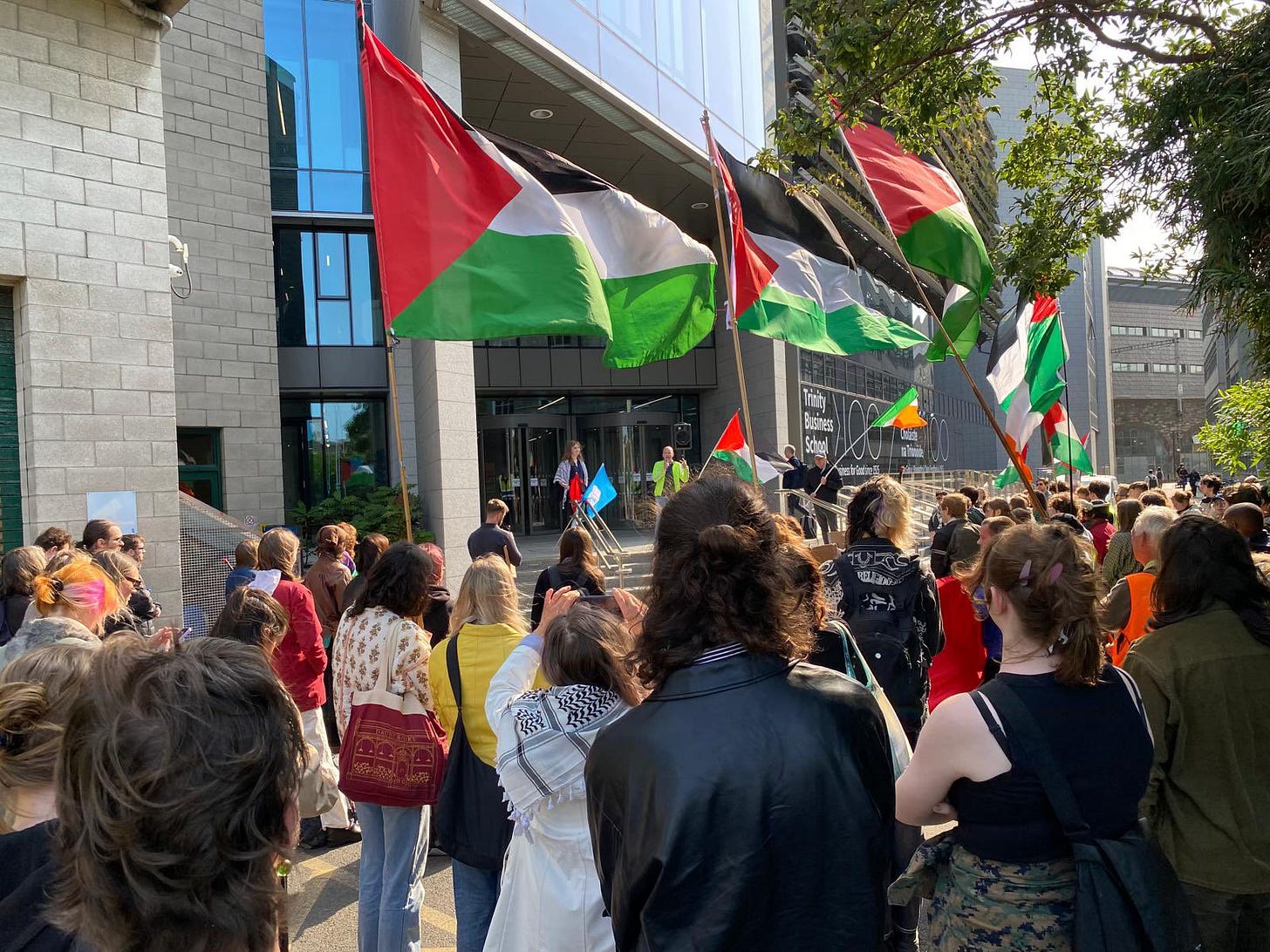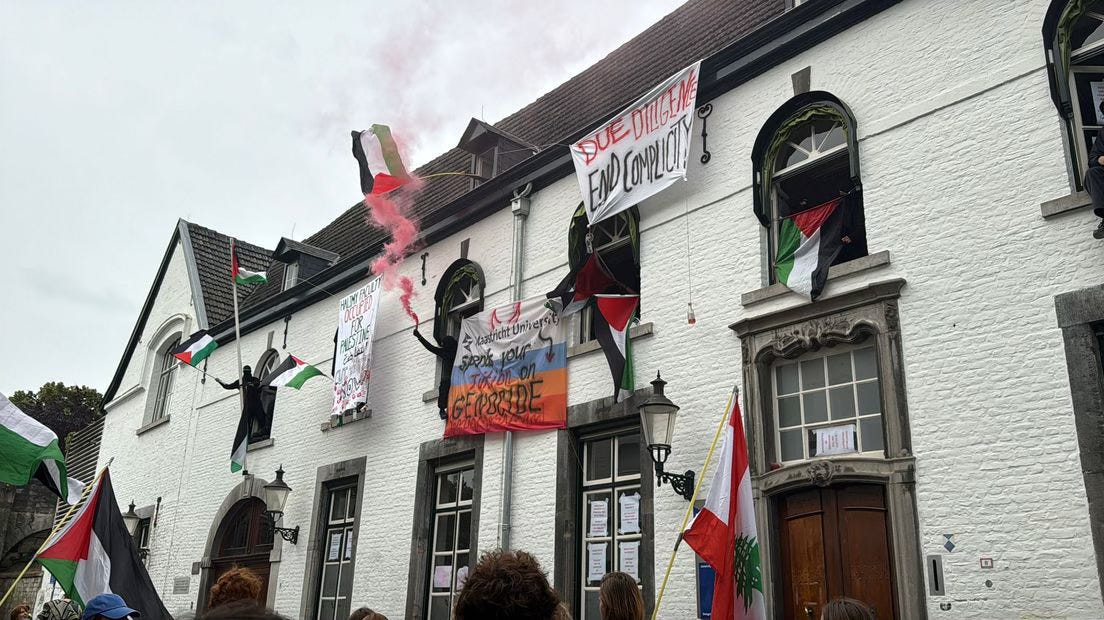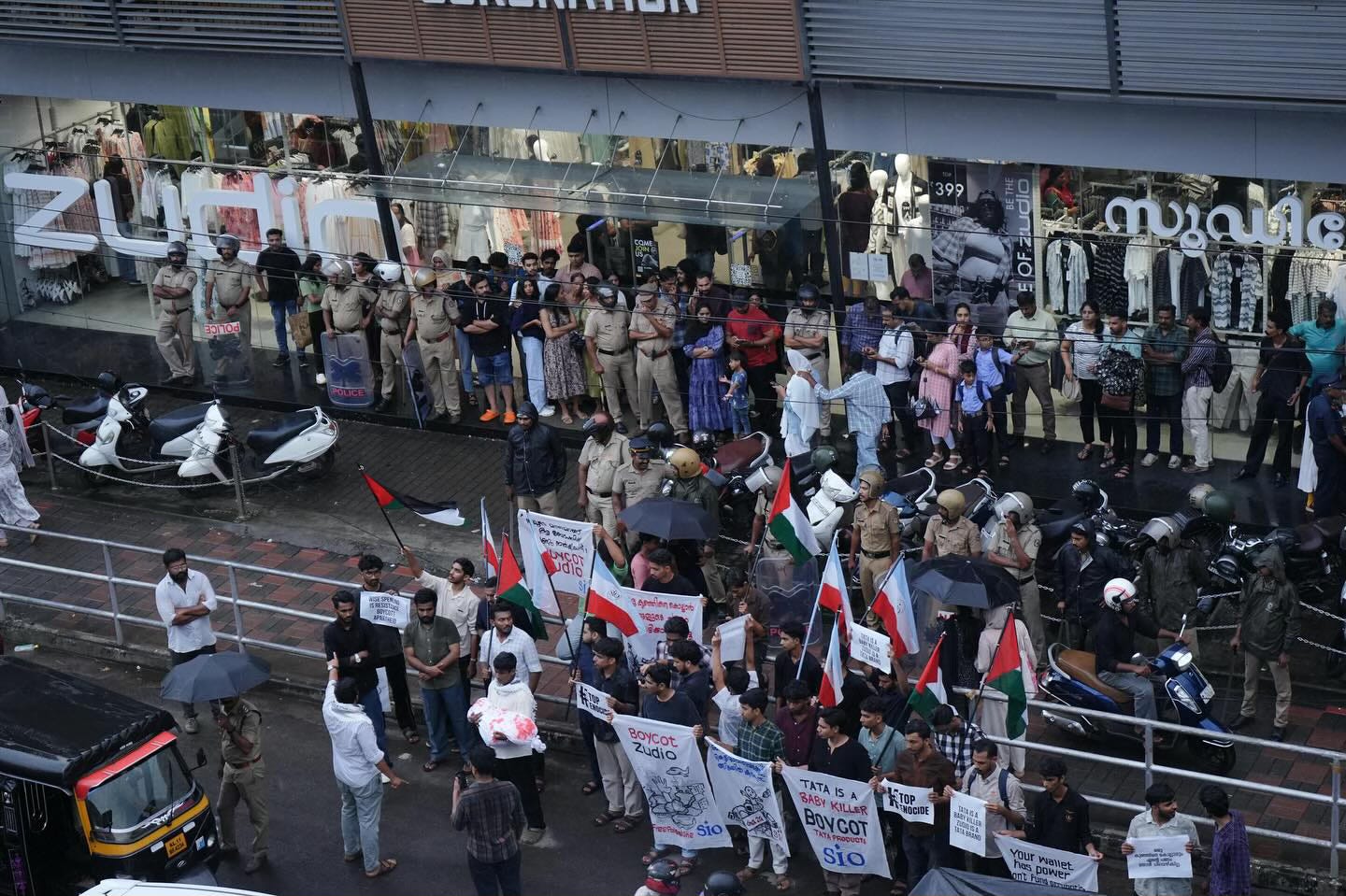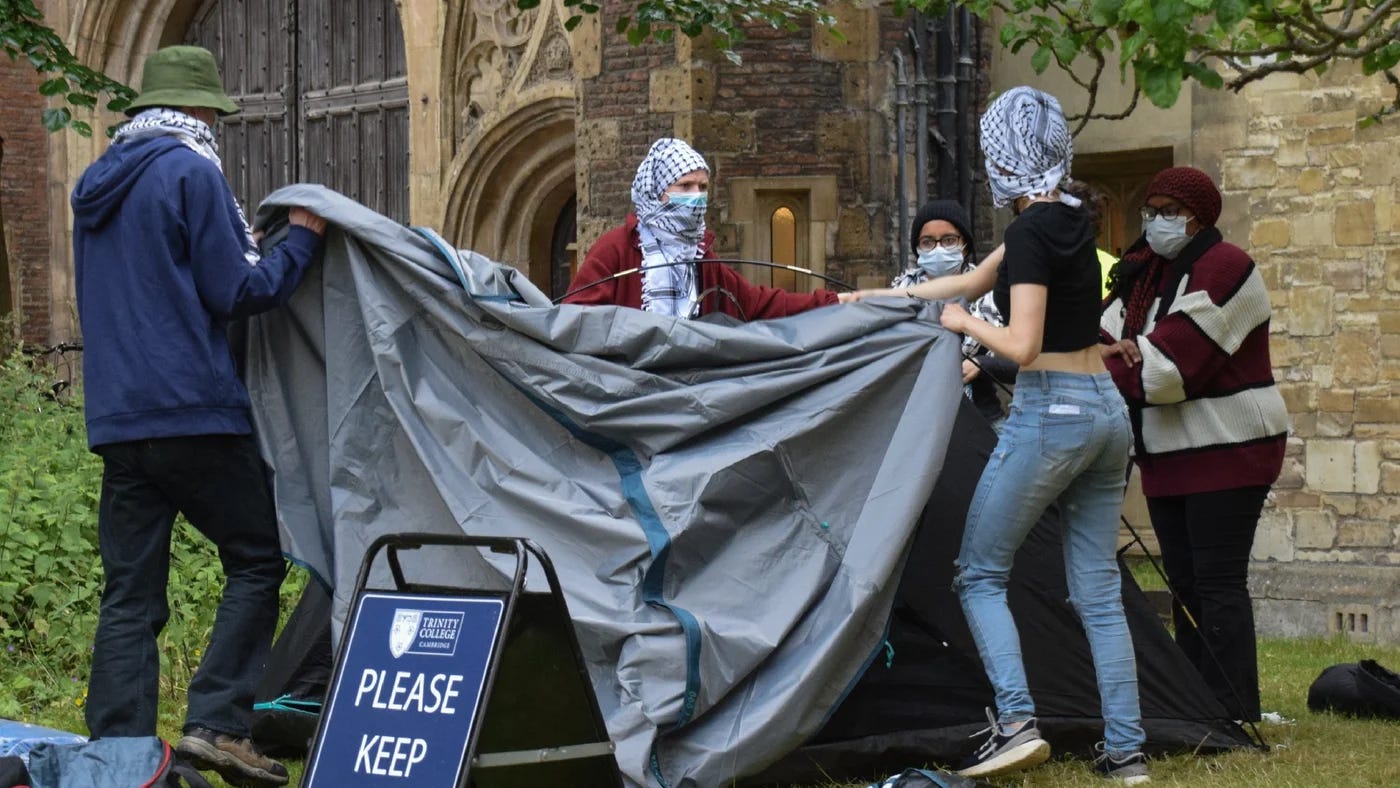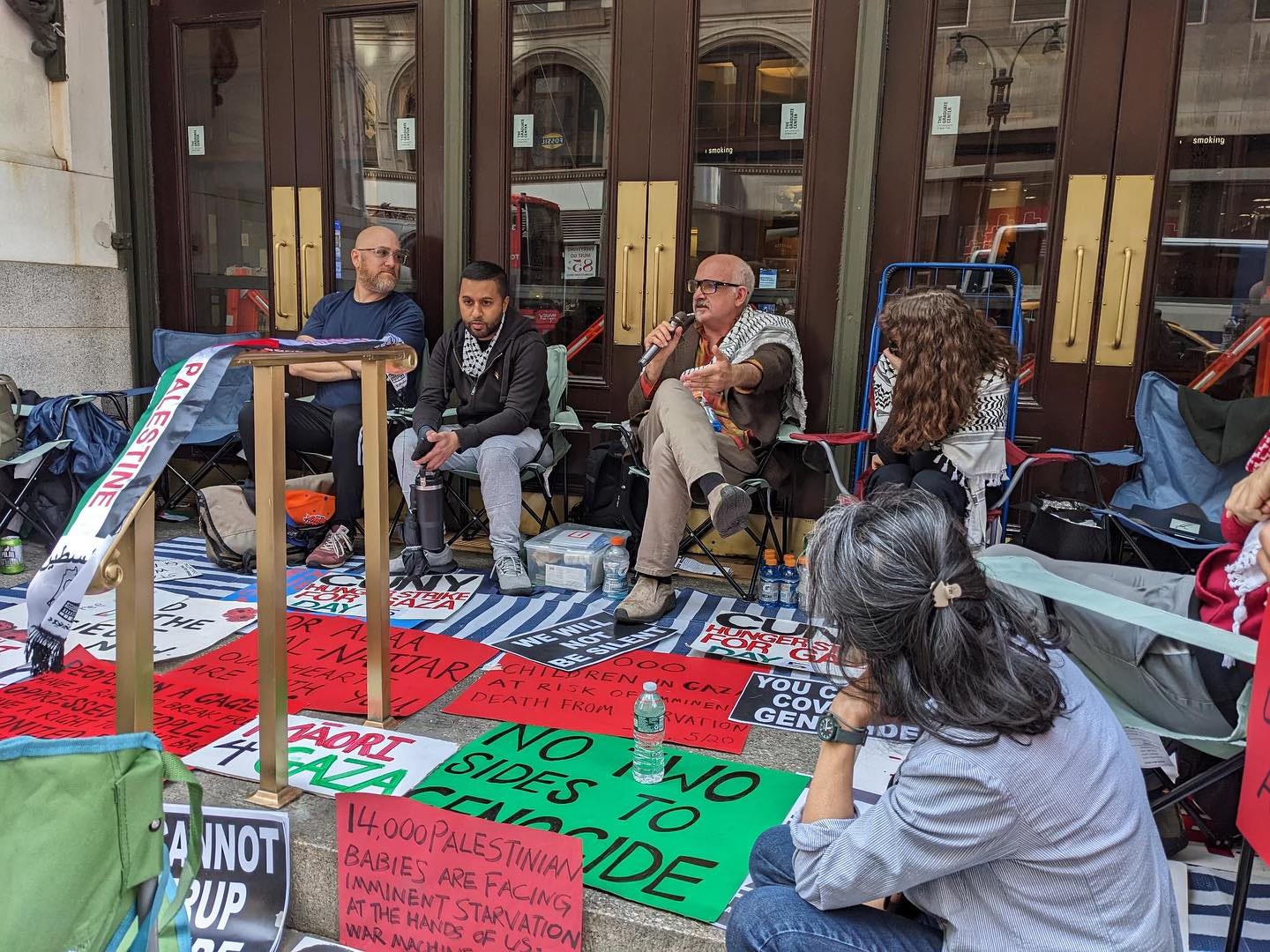Dublin Stands with Palestine: The Student Intifada, May 30-June 14
Divestment in Ireland, occupations in the Netherlands and hunger strike in the US, and much more from The Student Intifada.
Welcome and welcome back.
On June 1st, the Madleen Aid Flotilla set sail for Gaza, one of many aid flotillas that have attempted to enter Gaza since the zionist entity’s blockade began almost two decades ago. Twelve volunteers boarded the flotilla, all with origins spanning across the world: from Brazil, Germany, France, the Netherlands, Turkey, Spain, and — the most discussed — Sweden. Greta Thunberg, environmental activist and advocate for Palestinian liberation, as well as volunteer onboard the flotilla, has been the focus of most of the media coverage of the Madleen. With the kidnapping of the Madleen’s crew on June 9th, western media have highlighted videos of Thunberg’s capture and her reports of her treatment by israel. These contrast starkly to their lack of similar coverage for thousands of arbitrarily detained Palestinian political prisoners.
Thunberg, alongside all of the Madleen volunteers, is deeply courageous and is undeniably on the right side of history. In spite of this, and through no fault of her own, the disparity in coverage is emblematic of a larger issue in coverage of pro-Palestine advocacy as a whole. Thunberg’s kidnapping received rightful coverage, as was deserved, but the same extent scarcely applied for Thiago Avila, a Brazilian volunteer, or even Rima Hassan, a French member of the EU Parliament and of Palestinian origin.
The central issue, of course, lies not with the Madleen. The issue is not with the Palestinian liberation movement. The issue is with the media’s entire framing in and of itself. The issue is with the larger narrative surrounding the pro-Palestine movement. The same reason that Avila and Hassan didn’t receive the same coverage as Thunberg did is the same reason that students at Columbia and Cambridge received vastly more coverage than those at Seoul National University or the University of Chile.
All of this to say that there exists a bias towards western protests and western activist movements, especially towards white activists and white-dominated movements. While this isn’t something that activists for Palestinian liberation are responsible for, or can solve single-handedly, this bias is something to bear in mind. It should drive us towards an increased emphasis on protesters in the global south and outside of the English-speaking world, something which The Student Intifada attempts to do with each issue.
For the activists on the Madleen as well as throughout this Earth — through the past 614 days of this genocide and until the end of it — we as activists must not allow geography or color to serve as any barriers to unity as a movement. This is a global effort, after all.
For that reason, as TSI continues its work in this direction, please get in touch to contribute, wherever and whoever you are. We want to ensure that we cover the whole picture and, small as we are, embody the change that global media needs.
Updates from the intifada, May 30 - Jun 14
Ireland
On Wednesday 4th, Trinity College Dublin agreed to fully divest from israel and to cut all academic ties with israeli institutions. The university’s principled positioning makes it the first Western academic institution to fully and comprehensively do so, making this an incredible step in the directions of justice and Palestinian liberation. The BDS Movement hailed it as a profound success for Irish civil society, and called on other Western academic institutions to follow the example set. The move follows many decades of campaigning across Ireland, whose anti-colonial sympathies largely stem from its own history of brutal British colonial occupation.
Netherlands
On June 2nd, students occupied the University of Amsterdam. Activists from the United Front for Palestine proclaimed the Liberated Al-Najaar Campus and have been ongoing for now over ten days. They called for people to join on social media and wrote: “The liberated Al-Najjar Campus is a direct message to the Universiteit van Amsterdam: CUT ALL TIES WITH GENOCIDE! All ‘israeli’ universities are directly complicit in the industrial mass murder and ethnic cleansing of Palestinians; until UvA cuts all ties to these institutions, our university is stained in blood…AL-NAJJAR CAMPUS is a radical, democratic space, open for all to feel safe raising their voice in support of Gaza.” Separately, students have highlighted extensive academic ties between their university and the zionist entity’s, including exchange agreements and research collaborations with no fewer than eight institutions.
On Tuesday 3rd, students occupied Utrecht University, with activists declaring the liberated zone as the ‘Souad Slaik’ Building. They were evicted the following morning at 7:30 by police and a university spokesperson. Student and staff stress that Utrecht University has 10 standing ties with israel, and state that “in the last couple of weeks, an unprecedented outpouring of voices from across the university has urged the administration to cut ties, leaving the board more isolated than ever”.
The same day, students from the Vrije Universiteit (VU) Amsterdam established the Khalid Abu Yahia encampment. The encampment remains ongoing and is named in honour of the Palestinian academic, writer, and activist who was martyred by the IOF early into the genocide before he could attain his PhD. Yahia was murdered along with at least six family members at the beginning of the zionist campaign of scholasticide. Activists highlighted that “The VU currently has 14 known ties to israeli institutions at the heart of gross human rights violations, such as Tel Aviv, Bar Ilan, and Reichman Universities”, but also questioned how extensive the full list might be: “We don’t know; they won’t tell us.”
On Tuesday 3rd, students from Radboud University disrupted a lecture by an IOF terrorist spokesperson who was invited to the University by the dean of the Faculty of Arts. Student activists rightly labelled the event as zionist “propaganda” and an “excuse for the genocide” in Gaza, declaring that “resistance is justified when people are occupied”. Students were forcibly removed from the lecture hall and threatened with arrest.
On Thursday 5th, Erasmus University in Rotterdam announced it will freeze collaborations with Bar-Ilan University Tel Aviv, Hebrew University Jerusalem, and University of Haifa. According to activists, this is not cutting ties, but a partial distance that may still allow for ongoing research and educational programs.
On Friday 6th, after 20 days of occupation in Nijmegen, Radboud University students disbanded their camp, stating, “Given the consistent failure to engage with our protest camp, the outright refusal to engage in negotiations, the consistent deployment of police dogs and the web of lies crafted in the media, we are taking further action. While we disbanded the camp, we now target your crown”. The camp was the ground for several actions and protests, and police violence was high in Nijmegen: a few weeks ago, a student was mauled by a police dog and others severely injured.
On Tuesday 10th, Maastricht University was occupied. Student activists occupied a faculty building, renaming it “Medo Halimy Faculty” after Halimy, a martyr who had gained a following on Instagram documenting his life under genocide, documenting the garden that he was growing by his tent. He was murdered by israeli airstrikes almost a year ago. The protesters demand that their university cuts all existing ties with israel, including consortium agreements, urging other Dutch universities to follow suit, and to publicly condemn the ongoing genocide and illegal blockade.
Activists were evicted later the same day, by police exerting disproportionate violence in some cases. The University claimed that the local municipality took the decision, however students and staff say that the University played a part in the arrests. During the eviction, a large support demonstration continued to cheer the students on, and picket lines of both students and staff formed to prevent police from entering the building and to block the bus of arrested students. Police kidnapped the occupying activists, taking them in a bus and releasing them in a field in the outskirts of Maastricht. This is illegal, but happens frequently at Dutch protests.
India
On Wednesday 4th, Students Islamic Organisation of India activists in Kerala’s Kozhikode marched to an outlet of Zudio, a Tata-owned fashion retail brand, accusing the Tata Group of being complicit in the genocide. The activists said that the Tata Group’s financial and defence collaborations with israel amount to direct complicity in israeli military operations and surveillance infrastructure.
UK
On Friday 30th, students at King's College London (KCL) ended their 16-day encampment on the Strand Quad. KCL’s pro-Palestine student group, KCL Stands for Justice, reiterated in a statement that this is not the end of their advocacy: “We remain committed to employing all necessary tactics to compel this university to fully divest from genocide and complicity in apartheid. We may have decamped, but we have not deescalated.”
On Saturday 31st, students at the University of Cambridge relaunched their encampment outside of Trinity College Hall. Activists from Cambridge for Palestine (C4P) demanded that their university’s administration takes “urgent steps” to end the institution’s “moral and material complicity in israel’s genocide of Palestinians.” C4P stated their four core demands: full disclosure of colleges’ financial ties to israeli violations of international law (presumably including occupation, annexation, apartheid, and genocide); full divestment from any and all disclosed zionist crimes; reinvestment into Palestinian communities, including Palestinian students and academics at Cambridge; and rebuilding Gaza’s higher education and supporting through it via relationships. In response, no more than five days later, Cambridge announced that it would be seeking court injunctions against the students’ encampment.
On Tuesday 11th, students at Imperial College London disrupted an event held by Microsoft and promoting their AI technology services, utilised by the zionist military in the genocide in Gaza. Student protestors disrupted Glen Robinson, National Technology Officer for Microsoft UK’s, address, saying “your profits are covered in Palestinian blood…your AI technologies are being used to kill Palestinian children, how can you answer to that?” (One recent investigation revealed that “Microsoft has a “footprint in all major military infrastructures” in israel, and sales of the company’s cloud and artificial intelligence services to the israeli army have skyrocketed since the beginning of its onslaught on Gaza”.)
The day prior, one Imperial medical student, Hiba, announced her decision to go on hunger strike in solidarity with Gaza and against her university’s complicity in the massacres. The conditions for ending her strike are two-fold: firstly, full investigation into islamophobia and anti-arab racism, which she says are “too common” at Imperial; secondly, new mechanisms for popular financial oversight of the university, because “Imperial funds genocide”.
On Wednesday 12th, students from the London School of Economics (LSE) released a truly condemning new report into their university’s financial complicity in zionist settler-colonialism. One year after their previous report, Assets in Apartheid, students at LSE have returned with an even more damning investigation. Their latest publication, Stakes in Settler Colonialism, was launched this week to a packed room of students, staff, and supporters. The report is the product of over seven months’ worth of research by members of the LSESU Palestine Society, and offers a forensic account of LSE’s financial ties to genocide, the global arms trade, and climate destruction. The data are staggering. (Details to follow soon, in a longer feature. Or click the link.)
Students held a presentation on the key findings of their research, before breaking into political education discussion groups, and then holding a campus march and rally. Speaking at the event, one of the student authors of the report described the launch as “a painful reminder” of just how little has changed. “It’s been 614 days since the genocide began. And we are still standing in the same building, having the same conversation. LSE is still invested in apartheid.”
Also present at the launch were a delegate from the Palestinian Youth Movement and Andrew Feinstein, former South African MP and anti-apartheid activist who served under Nelson Mandela. Feinstein recalled that LSE was the first UK university to divest from apartheid South Africa in the 1980s. “The roots of israeli and South African apartheid are identical,” he said. “The fact that LSE refuses to divest from one when it proudly divested from the other is a moral failure.”
USA
Starting May 27th, eight students and faculty members within the City University of New York system (CUNY) have been on a hunger strike to demand divestment from the zionist entity. Writing for Mondoweiss, the students demanded, “We refuse to allow our tuition and tax dollars to fund genocide. We refuse to allow our university to profit off our academic research into colonialism while materially investing in the most brutal forms of colonial violence. We will be on hunger strike until CUNY divests.” Students have, since then, been protesting on the steps of the CUNY Graduate Center with materials teaching about Palestinian liberation.
On Wednesday 10th, a federal judge ruled that Mahmoud Khalil, Columbia University student and political prisoner facing deportation for involvement in pro-Palestine campus advocacy, could not be deported or detained and must be released. He is still awaiting release and — albeit unlikely — justice.
Following protests against the University of Texas Dallas (UTD), one campus part of Texas’s larger University of Texas system, hosting war manufacturers such as Elbit and RTX on May 16th, UTD has been targeting several students involved with the action with suspension. On June 5th, UTD administration intensified this targeting by assisting in the arrest of a recent graduate.
Parting thoughts
We at TSI are humbled each and every week by the principled actions of our comrades around the world and its universities (and seas). In spite of what sometimes feel like overwhelming odds — facing against the worst evils of capitalist imperialism and its deep ties, through zionism, to our own places of study and work — the world’s masses continue to stand proudly by the side of the Palestinians in their darkest moment, in spite of the personal costs and cruelest repression. Let that give us all hope and inspiration to continue: as the Dubliners have shown us, change is possible — and maybe closer than you think.
TSI occupies a small and, perhaps, niche space as an alternative to a media ecosystem which — as our intro to today’s newsletter indicates — carries all the biases and injustices of the biased and unjust world it inhabits and claims to represent. In many cases, as our own reporting makes legible, media outlets often make matters much worse by obscuring the movements challenging power today. So thank you for reading up to here, truly, and for supporting our coverage of this vital movement. Please consider sharing our work.
In that vein, if you wish to listen to the marginalised experiences of one powerful Palestinian speaker and also support necessary new media, then check out this interview with Ahmed Alnaouq by Novara Media’s Ash Sarkar. Alnaouq’s entire family were tragically martyred by the zionist forces early into the genocide and, understandably, Sarkar describes it as one of her most profound interviews ever. He’s worth hearing, every word of every minute.
With that, thanks again, and until the next newsletter — for a Free Palestine.
In solidarity and resistance, The Student Intifada.
Written this week by comrades from the UK, India and the US.



